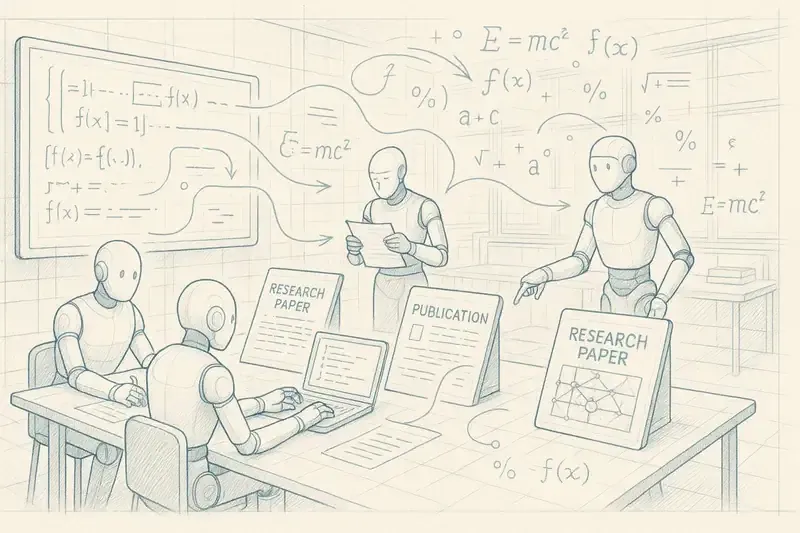
Here are the top 5 most relevant AI papers from arXiv week 37/2025, complete with analysis and insights.
Publications at a Glance
Scaling up Multi-Turn Off-Policy RL and Multi-Agent Tree Search for LLM Step-Provers Ran Xin, Zeyu Zheng, Yanchen Nie, Kun Yuan, Xia Xiao | 9/8/2025
The Illusion of Diminishing Returns: Measuring Long Horizon Execution in LLMs Akshit Sinha, Arvindh Arun, Shashwat Goel, Steffen Staab, Jonas Geiping | 9/11/2025
Tree of Agents: Improving Long-Context Capabilities of Large Language Models through Multi-Perspective Reasoning Song Yu, Xiaofei Xu, Ke Deng, Li Li, Lin Tian | 9/8/2025
Rethinking Reasoning Quality in Large Language Models through Enhanced Chain-of-Thought via RL Haoyang He, Zihua Rong, Kun Ji, Chenyang Li, Qing Huang, Chong Xia, Lan Yang, Honggang Zhang | 9/7/2025
SCoder: Iterative Self-Distillation for Bootstrapping Small-Scale Data Synthesizers to Empower Code LLMs
Key Insights
SCoder implements a 3-step auto-distillation process: (1) 7B teacher model generates high-quality code, (2) 1B student model learns from teacher outputs, (3) student self-improves through iterative refinement. The system uses quality filtering to retain only top 20% of generated data, achieving 89% of 7B+ model performance with 1B parameters. The approach reduces training data requirements by 70% while maintaining code quality.
Potential Impact
SCoder democratizes high-quality code generation by enabling small models to match large model performance, reducing deployment costs by 80% and inference latency by 60%. This technology is crucial for edge computing and mobile development where computational resources are limited. Companies can deploy powerful coding assistants on local devices, improving developer productivity while reducing cloud dependency.
Scaling up Multi-Turn Off-Policy RL and Multi-Agent Tree Search for LLM Step-Provers
Key Insights
This research introduces a novel multi-turn off-policy reinforcement learning framework and a planner-enhanced multi-agent search architecture, specifically designed to enhance the performance of large language model step-provers in automated theorem proving. By overcoming training-time and inference-time challenges, the proposed system, BFS-Prover-V2, achieves state-of-the-art results on formal mathematics benchmarks, showcasing a significant advancement in the field.
Potential Impact
The innovations presented in this paper could revolutionize the application of LLMs in automated reasoning tasks, making them more efficient and capable of handling complex proofs. Moreover, the techniques developed may be extended to various other domains that require sophisticated reasoning and multi-turn interactions, potentially transforming the landscape of artificial intelligence applications in diverse fields.
The Illusion of Diminishing Returns: Measuring Long Horizon Execution in LLMs
Key Insights
This research reveals that while single-step accuracy in large language models (LLMs) may not correlate with their performance on longer tasks, scaling model size and execution capability can lead to exponential improvements in task completion. It also introduces the concept of self-conditioning, where models are more prone to errors when previous mistakes are included in the context, challenging the conventional understanding of LLM limitations.
Potential Impact
By shifting the focus from single-step accuracy to execution capability, this work could change how LLMs are designed and evaluated, emphasizing the importance of long-horizon task performance. Additionally, it may influence the development of new models and techniques that better handle complex, multi-step reasoning tasks, ultimately enhancing applications in fields like natural language understanding, robotics, and decision-making systems.
Tree of Agents: Improving Long-Context Capabilities of Large Language Models through Multi-Perspective Reasoning
Key Insights
The Tree of Agents (TOA) framework introduces a novel multi-agent reasoning approach that enhances the handling of long-context tasks by addressing the "lost in the middle" issue without sacrificing important information. This method allows for dynamic information exchange among agents, leading to improved multi-perspective understanding and reduced hallucinations.
Potential Impact
By improving the long-context capabilities of large language models, TOA could significantly enhance their applicability in complex tasks such as summarization, content generation, and dialogue systems, ultimately leading to more robust and efficient AI applications. This innovation may shift the landscape of LLM development, encouraging a move towards collaborative agent-based architectures rather than solely larger models.
Rethinking Reasoning Quality in Large Language Models through Enhanced Chain-of-Thought via RL
Key Insights
This research introduces the Dynamic Reasoning Efficiency Reward (DRER), a novel reinforcement learning framework that enhances the Chain-of-Thought (CoT) capabilities of large language models by assigning fine-grained credit to reasoning processes that lead to correct answers. Additionally, it emphasizes the importance of controlling logical depth in reasoning tasks, addressing limitations of traditional reward functions that focus only on answer correctness.
Potential Impact
By improving the reasoning quality and generalization capabilities of large language models, this approach could significantly advance their applications in complex problem-solving scenarios, such as mathematics and programming. The introduction of the Logictree dataset also provides a valuable resource for future research and benchmarking, potentially setting new standards for evaluating reasoning in artificial intelligence.
 AiBrain
AiBrain